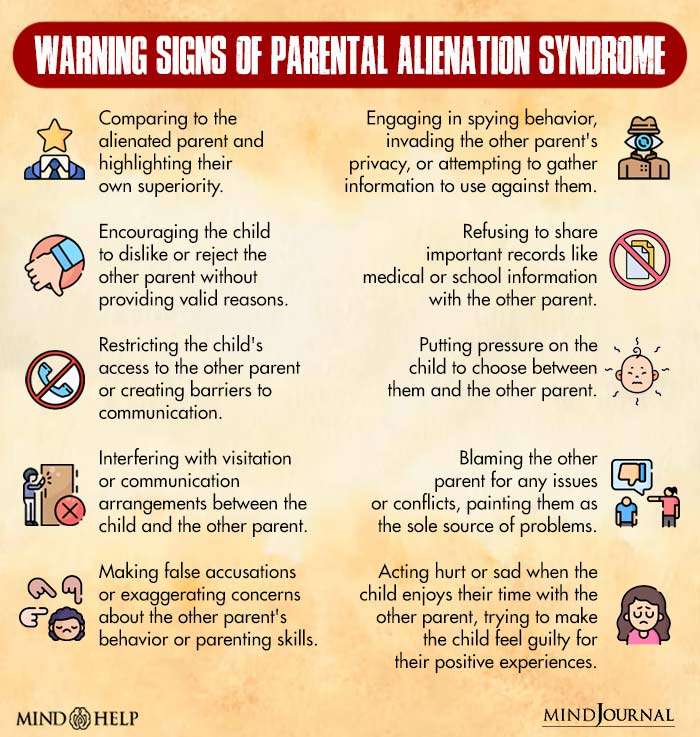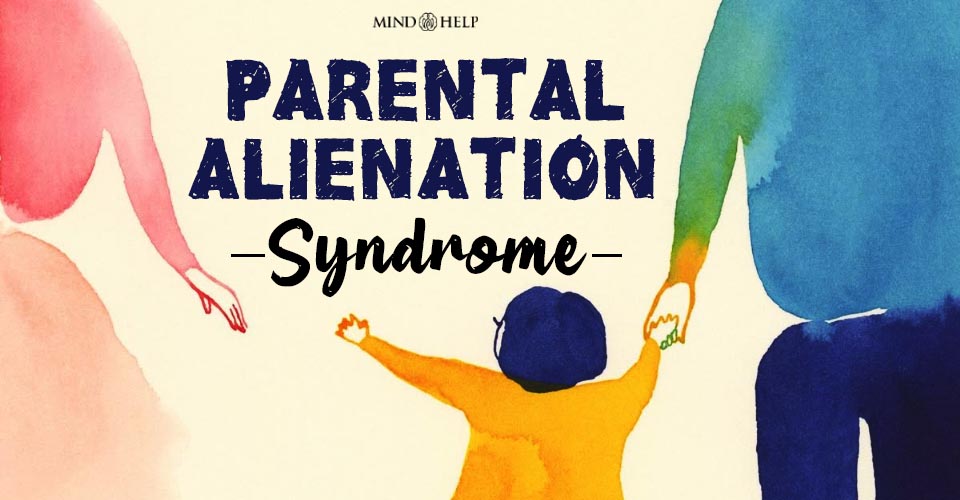Table of Contents
Parental Alienation Syndrome (PAS) is a controversial psychological concept that describes a situation where a child becomes estranged from one parent due to the psychological manipulation by the other parent, typically during or after a high-conflict divorce or custody battle.
Coined by psychiatrist Dr. Richard Gardner in the 1980s, PAS refers to a set of behaviors in a child that include unjustified fear, disrespect, or hostility toward one parent, often as a result of the other parent’s influence.
Core Features of Parental Alienation Syndrome:
- Campaign of denigration: The child constantly criticizes the targeted parent, often without strong justification.
- Weak, frivolous, or absurd rationalizations for the criticism.
- Lack of ambivalence: The child sees one parent as entirely good and the other as entirely bad.
- “Independent thinker” phenomenon: The child insists the rejection is their own idea, not influenced by the alienating parent.
- Reflexive support for the alienating parent.
- Absence of guilt about cruel treatment of the rejected parent.
- Use of borrowed phrases and adult language, likely mimicking the alienating parent.
- Spread of animosity to the rejected parent’s extended family.
Common Behaviors by the Alienating Parent:
- Badmouthing the other parent in front of the child.
- Limiting contact or communication between the child and the other parent.
- Creating false allegations of abuse or neglect.
- Encouraging the child to reject gifts or affection from the targeted parent.
Impact on the Child:
- Emotional distress, confusion, loyalty conflicts.
- Poor self-esteem, anxiety, depression.
- Damaged ability to form healthy future relationships.
Controversy:
- Not officially recognized by the DSM-5 or ICD-11 as a mental health disorder.
- Some experts argue it can be misused in court to dismiss legitimate claims of abuse.
- Others assert that the concept is real but should be framed more broadly as parental alienation rather than a “syndrome.”
Many psychologists now refer to the behavior as Parental Alienation rather than “Parental Alienation Syndrome,” to avoid medicalizing the child’s reaction and to focus more on the manipulative behaviors by the parent. But how to define parental alienation syndrome?
What is Parental Alienation Syndrome
Parental alienation syndrome (PAS) encompasses situations 1 Gardner, R., Sauber, R., & Lorandos, D. (2006). THE INTERNATIONAL HANDBOOK OF PARENTAL ALIENATION SYNDROME: Conceptual, Clinical and Legal Considerations. Available from: https://www.researchgate.net/publication/325531302_THE_INTERNATIONAL_HANDBOOK_OF_PARENTAL_ALIENATION_SYNDROME_Conceptual_Clinical_and_Legal_Considerations where a parent deliberately erects emotional barriers between their child and the other parent after a divorce or separation.
This manipulation involves using lies, exaggerations, and baseless accusations to influence the child’s thoughts and feelings, leading them to develop negative emotions or hostile behavior towards the targeted parent.
The term “parental alienation syndrome” was introduced by psychiatrist Richard A. Gardner 2 Farkas M. M. (2011). An introduction to parental alienation syndrome. Journal of psychosocial nursing and mental health services, 49(4), 20–26. https://doi.org/10.3928/02793695-20110302-02 in the 1980s. Studies have found that around 13.4% of parents 3 Harman, J. J., Leder-Elder, S., & Biringen, Z. (2019). Prevalence of adults who are the targets of parental alienating behaviors and their impact. Children and Youth Services Review, 106, 104471. https://doi.org/10.1016/j.childyouth.2019.104471 have experienced being alienated from one or more of their children.
The long-term effects of parental alienation on a child’s mental health can be profound and deeply damaging. Children may grapple with chronic feelings of depression, anxiety, guilt, divided loyalties, and diminished self-worth. Over time, these emotional struggles can severely impact their overall well-being, disrupt healthy psychological development, and affect their ability to form trusting relationships in the future.
Read More About Self-Esteem Here
Symptoms of Parental Alienation Syndrome
When discussing Parental alienation syndrome (PAS), Richard A. Gardner outlined eight symptoms or criteria 4 O’Donohue, W., Benuto, L. T., & Bennett, N. (2016). Examining the validity of parental alienation syndrome. Journal of Child Custody, 13(2-3), 113–125. https://doi.org/10.1080/15379418.2016.1217758 to identify it:
- The child persistently and unjustly criticizes the alienated parent, often repeating negative judgments without objective cause.
- These criticisms lack concrete evidence or valid reasoning, frequently based on false, exaggerated, or irrational justifications.
- The child’s view of the alienated parent is entirely negative, with no acknowledgment of their positive traits or any ambivalence.
- The child insists that their negative opinions are entirely their own, denying any influence from the alienating parent.
- There is a consistent pattern of unwavering loyalty to the alienating parent, regardless of the circumstances.
- The child shows no remorse or guilt for rejecting, mistreating, or expressing hatred toward the alienated parent.
- The child often uses adult-like language and phrases, suggesting these thoughts may have been shaped by someone else.
- The child’s hostility may extend to the alienated parent’s extended family, including grandparents, aunts, uncles, or cousins, further isolating them from that side of the family.
Causes of Parental Alienation Behaviors
Parental alienation behaviors can stem from 5 Isailă, O. M., & Hostiuc, S. (2022). Medical-Legal and Psychosocial Considerations on Parental Alienation as a Form of Child Abuse: A Brief Review. Healthcare (Basel, Switzerland), 10(6), 1134. https://doi.org/10.3390/healthcare10061134 a variety of factors, such as:
- High-conflict divorce or separation: When parents separate amidst intense and ongoing conflict, the likelihood of parental alienation increases significantly.
- History of abuse: Past abuse—whether between the parents or directed toward the child—can lead to alienation behaviors, sometimes as a distorted form of self-protection or control.
- Parental substance abuse: A parent struggling with addiction may exhibit impaired judgment, emotional instability, and an inability to prioritize the child’s needs, all of which can foster alienating behaviors.
- Unresolved emotional wounds: Lingering feelings of anger, resentment, or betrayal following the breakdown of the relationship can manifest as attempts to turn the child against the other parent.
- Parental personality disorders or traits: Narcissism, controlling behavior, or other psychological issues can drive a parent to manipulate the child’s perceptions, fueling the development of parental alienation.
Read More About Anger Here
Effects of Parental Alienation Syndrome on Children
Parental alienation syndrome (PAS) can have significant negative effects 6 Verhaar, S., Matthewson, M. L., & Bentley, C. (2022). The Impact of Parental Alienating Behaviours on the Mental Health of Adults Alienated in Childhood. Children (Basel, Switzerland), 9(4), 475. https://doi.org/10.3390/children9040475 on the children, such as:
- Anxiety symptoms: Children may experience persistent feelings of fear, worry, and low self-esteem, often struggling with a heightened sense of insecurity.
- Depressive symptoms: These can include prolonged sadness, trouble concentrating, low energy levels, and a pervasive sense of hopelessness.
- Self-blame: Many children internalize the conflict, believing they are responsible for the damaged relationship with the alienated parent.
- Self-harming behaviors: In severe cases, children may resort to self-injury as a coping mechanism to deal with the emotional pain caused by parental alienation.
- Social withdrawal: Children affected by parental alienation may begin to isolate themselves, even from peers at school, fearing rejection or judgment.
- Post-traumatic stress symptoms: Some may develop signs of PTSD, including intrusive thoughts, nightmares, and emotional flashbacks related to the alienation experience.
- Identity confusion and unhealthy coping: The psychological turmoil can lead to a fragmented sense of self, disordered eating patterns, or other harmful behaviors as children struggle to find stability.
Read More About Self-Harm Here

Parental Alienation Syndrome Treatment
The Parental alienation syndrome treatment requires 7 Darnall, D. (2011). The Psychosocial Treatment of Parental Alienation. Child and Adolescent Psychiatric Clinics of North America, 20(3), 479–494. https://doi.org/10.1016/j.chc.2011.03.006 the following approaches:
- Family therapy which involves the entire family coming together to communicate and share their perspectives and resolve the problems.
- Cognitive behavioral therapy (CBT) 8 Darnall, D. (2011). The Psychosocial Treatment of Parental Alienation. Child and Adolescent Psychiatric Clinics of North America, 20(3), 479–494. https://doi.org/10.1016/j.chc.2011.03.006 which can be useful for breaking free from negative thoughts and emotions that may have developed during childhood.
- Play therapy allows children to express complex emotions and thoughts through play, when they may struggle to communicate verbally.
- Group therapy which can help individuals understand how their childhood behavioral patterns affect their relationships and then working towards making positive changes.
Read More About Cognitive behavioral therapy (CBT) Here
How to Deal with Parental Alienation Syndrome
Here are some strategies 9 Templer, K., Matthewson, M., Haines, J., & Cox, G. (2016). Recommendations for best practice in response to parental alienation: findings from a systematic review. Journal of Family Therapy, 39(1), 103–122. https://doi.org/10.1111/1467-6427.12137 that may help to deal with the parental alienation syndrome:
- Encourage open and respectful communication with the other parent, when possible, to reduce conflict and model healthy co-parenting behavior.
- Seek professional support from mental health experts such as therapists or family counselors to help your child process emotions and rebuild trust.
- Show your love through consistent involvement in your child’s life—attend school events, extracurricular activities, and be present in both everyday and special moments.
- Avoid negative talk about the other parent in your child’s presence, as this can intensify confusion and emotional distress.
- In serious situations, consider legal intervention to safeguard your parental rights and ensure the emotional and physical well-being of your child.
Frequently Asked Questions (FAQs)
1. Is parental alienation a form of emotional abuse?
Parental alienation can be considered a form of emotional abuse as it involves one parent manipulating or undermining the child’s relationship with the other parent, causing emotional harm.
2. Can parental alienation cause mental illness?
Parental alienation can contribute to the development or exacerbation of mental health issues in children, such as anxiety, depression, and identity disturbances.
3. Is parental alienation a form of narcissism?
While parental alienation can be associated with narcissistic behaviors, it is not necessarily always indicative of narcissism, as it can be driven by various motivations and psychological factors.











